ABRLAB Research
Research
Research Interest
We focus on researching various functional materials for energy storage and their applications to Post Li-ion Batteries.
Our research targets the development of next-generation energy storage systems with high energy density, improved safety, and longer cycle life. We explore innovative electrode materials, electrolytes, and interfaces to enable high-performance batteries suitable for electric vehicles, grid storage, and wearable electronics. These efforts include a comprehensive study of advanced solid electrolytes, novel cathode chemistries, and metallic anodes etc. that offer high scalability and low environmental impact.
By optimizing material properties and interfaces, we aim to achieve breakthroughs in the electrochemical performance of energy storage devices that can overcome the limitations of current lithium-ion technology and meet the demands of future applications.
in next-generation Li-ion batteries
Functional Energy Materials

"Functional Materials” for Next-Generation Li-ion Batteries
Our research focuses on the development of cutting-edge battery materials to revolutionize the performance of next-generation Li-ion batteries. By exploring innovative approaches, we aim to enhance the cyclability and efficiency across various battery systems, including Li metal batteries (LMB), anode-free Li metal batteries (AFMLBs), Mg-ion/metal batteries, all-solid-state batteries, and metal-air batteries.
In addition to these efforts, we are actively working on high-capacity alloying and conversion anode materials including various metal anodes, which offer the potential to significantly boost energy storage capacity. Furthermore, our research delves into cathode interface engineering, aiming to optimize electrochemical stability and overall battery performance. Through these multidisciplinary studies, we strive to advance the frontier of battery technology, contributing to the development of more durable, high-capacity energy storage systems for a wide range of applications.
All-solid-state batteries
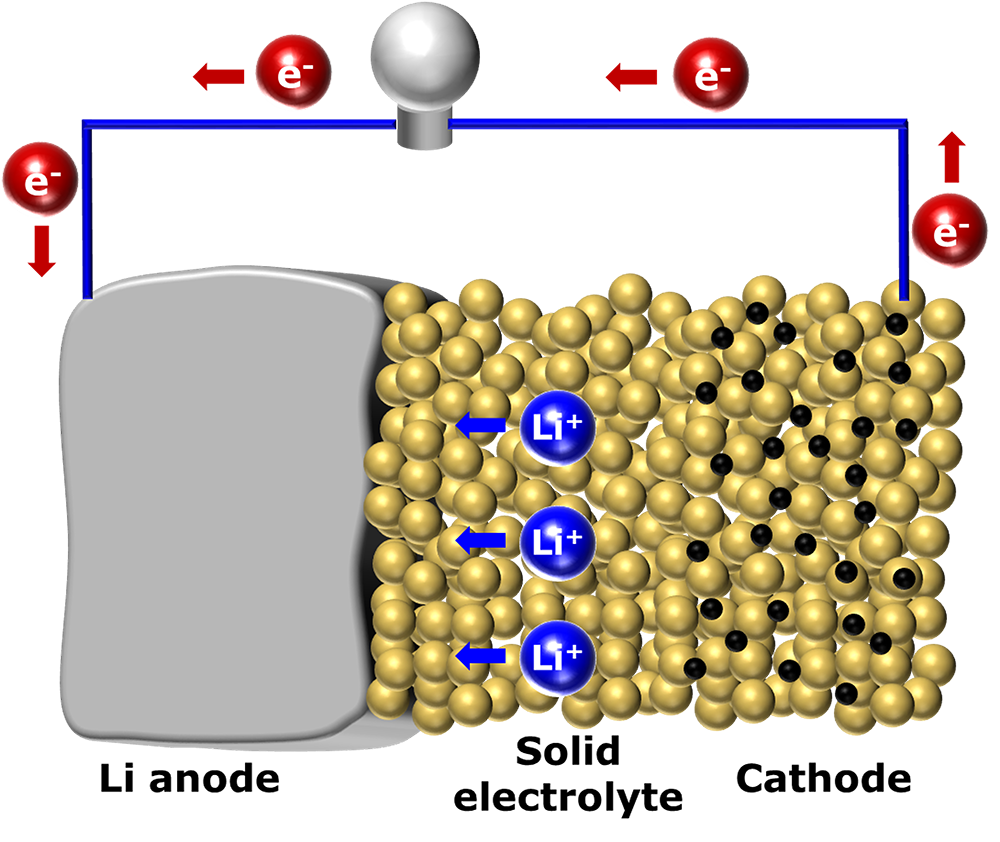
- High safety
- Non-flammability
- No gas generation
- Broad temp. range
"Highly Safe” Solid electrolyte & All-solid-state batteries
The fast-growing markets for electrical devices have naturally forced current portable batteries to progress to the next-generation battery systems. Among many requirements for next-generation battery systems, the first task would be to ensure a high level of safety, considering that an explosion in a huge battery system could cause a large accident. In this respect, much attention has been focused on all solid state batteries (ASSBs) with the hope of developing highly safe batteries.
Our effort has been devoted to search for new solid electrolyte (SE) materials and their synthesis routes through a liquid-based processing. We believe that the solution-based synthesis method may solve many of the challenges faced in the field of ASSBs
among the next-generation batteries
Multivalent-ion batteries
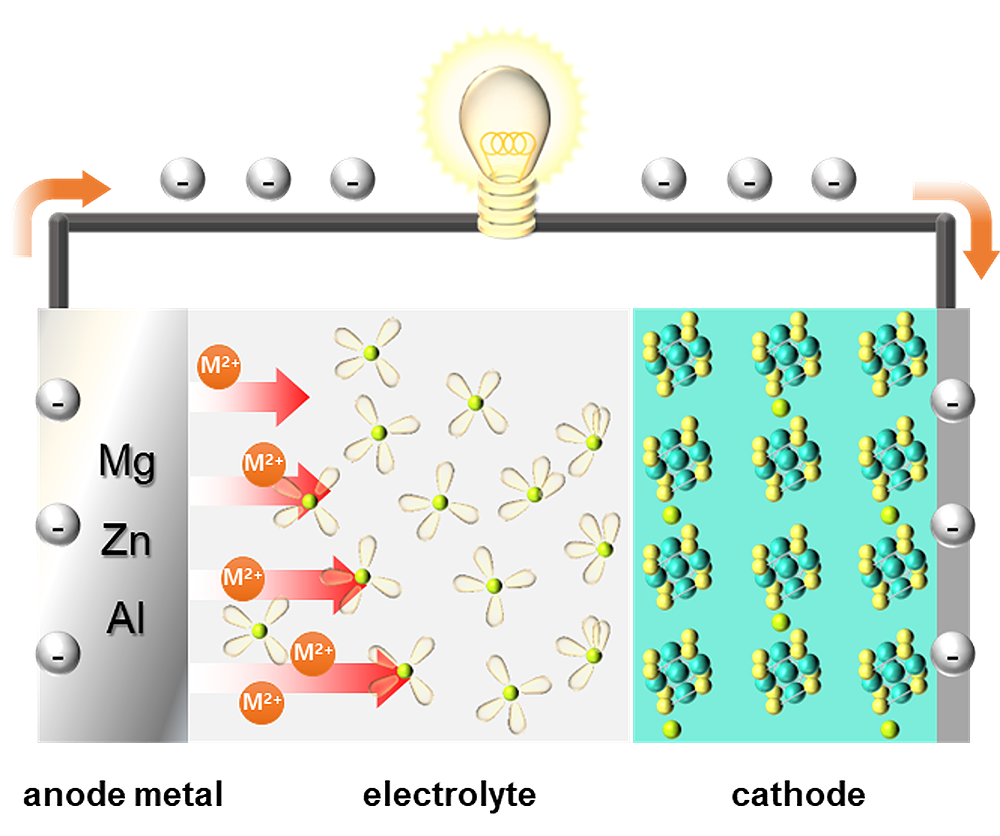
- Low cost
- Earth abundant
- Earth metal
- High vol. capacity
"Low Cost” Multivalent-ion batteries
Because of the limited Li mineral deposits, the cost of Li battery pack is estimated to continually increase. In this respect, there is an urgent need to explore alternatives, especially a low-cost metal source. Among candidates, multivalent-ion (Mg, Zn etc) batteries have recently attracted great attention as an ideal substrate; the cost of Mg source is approximately 6 times lower compared with that of Li, thanks to the abundance of Mg compounds in the Earth's crust
We focus on the studies of new electrode materials, electrolytes, and anode metals for the efficient and reversible multivalent-ion batteries. We hope that our research activity can contribute to the development of low cost and practical next-generation batteries.
Metal-air batteries
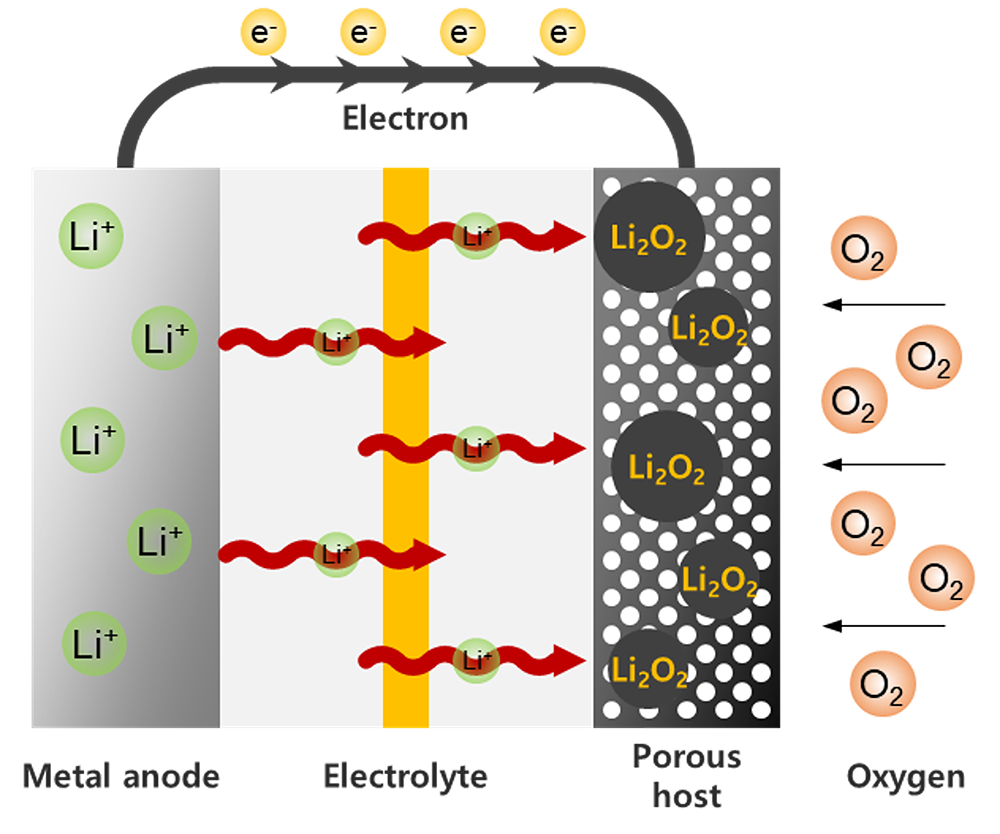
- High energy density
- Low cost
- Environment-friendly
- Non-toxic
"High Energy” Metal-air batteries
A great deal of interest has recently focused on Li–O2 batteries as potential high energy density storage systems. It can deliver the highest energy density among any other types of batteries because Li and O directly react in the absence of any heavy transition metals or crystal framework. However, key limitations, such as poor cyclability and low coulombic efficiency, must be resolved for the Li–O2 battery to be considered for extensive applications.
Our research has focused on designing a broad range of air-electrode that can deliver the high capacity with high power. Also, we are actively developing various efficient solid / soluble catalyst incorporated with the hierarchically porous framework.
with Ultra-High Density (3,860 mAh/g)
Li-metal batteries
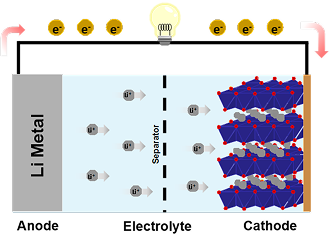
- High energy density
- Low redox potential
- Lightness
- Simple fabricating steps
"High energy density” Li-metal batteries
As the demand for higher capacities in applications such as electronic devices and electric vehicles continues to grow, anode materials must evolve accordingly. Although carbon-based anodes offer excellent stability, it is becoming increasingly difficult for them to match the capacity of advanced cathode materials. As a breakthrough solution, Li metal batteries have emerged as a next-generation technology, offering an exceptionally high energy density of 3860 mAh g-1 — more than ten times that of traditional carbon anodes (372 mAh g-1). However, Li metal anodes face critical challenges, including volume expansion, dendrite formation, and overall instability.
To address these issues, our research focuses on developing safer and more reliable Li metal anodes through innovative strategies. Current efforts include the design of advanced electrolytes and additives, the construction of artificial protection layers, and extensive material engineering studies. We are committed to overcoming these challenges and advancing the practical realization of high-performance Li metal batteries.
with earth-abundant materials
Li-sulfur batteries
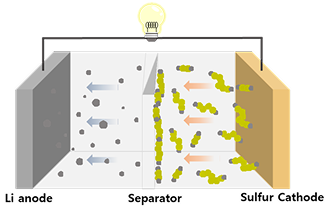
- High energy density
- Lightweight sulfur
- Cost-effective
- Advanced energy storage
“Sustainable” Li–sulfur batteries
Lithium–sulfur (Li–S) batteries have attracted strong interest as next-generation energy storage systems owing to their exceptionally high theoretical energy density and the low cost and natural abundance of sulfur. Compared to conventional lithium-ion batteries, Li–S batteries offer the potential for significantly higher gravimetric energy density while reducing reliance on critical transition-metal resources.
Our research focuses on the development of high-efficiency sulfur cathodes and functional separators to suppress polysulfide shuttling and enhance redox reversibility. In parallel, we are developing advanced anode technologies specifically tailored for Li–S batteries to stabilize the lithium metal interface and improve cycling stability. Through these integrated cathode, separator, and anode design strategies, we aim to realize high-performance and practical Li–S batteries for next-generation energy storage applications.